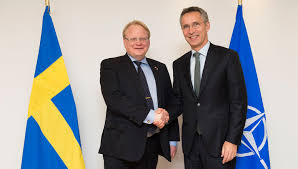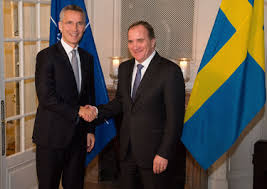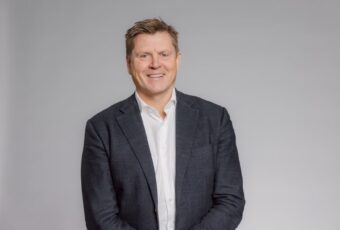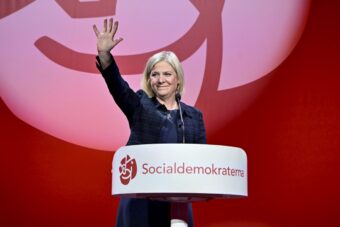
WARSAW, Poland (AP) — NATO leaders geared up Friday for a long-term standoff with Russia, ordering multinational troops to Poland and the three Baltic states as Moscow moves forward with its own plans to station two new divisions along its western borders.Alliance Secretary-General Jens Stoltenberg said that on the first day of a landmark two-day summit, U.S. President Barack Obama and leaders of the 27 other NATO countries also declared the initial building blocks of a ballistic missile system operationally capable, recognized cyberspace as a domain for alliance operations, committed to boosting their countries’ civil preparedness, and renewed a pledge to spend a minimum of 2 percent of their national incomes on defense.
Swedish Participation
Prime Minister Stefan Löfven, Defence Minister Peter Hultqvist and Foreign Minister Margot Wallström participating in the NATO Summit 2016 in Warsaw on 8-9 July. The meeting will include cooperation between the EU and NATO and common security challenges to be discussed, as well as developments in the Eastern Neighbourhood. «We have just taken decisions to deliver 21st century deterrence and defense in the face of 21st-century challenges,» Stoltenberg told a news conference. He said the leaders’ decision to deploy new alliance units to Poland, Estonia, Latvia and Lithuania on a rotational basis is «an open-ended commitment» designed to last «as long as necessary.» Polish President Andrzej Duda, the summit’s official host, warned that Western democratic values are being undermined by a «notorious lack of respect for international law» as well as terrorism and high-tech warfare, and said NATO needs a coherent strategy to address those problems. After arriving in Warsaw, Obama announced his decision to send an additional 1,000 U.S. troops to Poland as part of the NATO effort to reinforce its presence on the alliance’s frontiers near Russia. Following bilateral talks, Duda thanked him, saying Poles «are grateful for the goodwill, for understanding that security is where the world’s strongest army is, and that army is the U.S. Army.»
Firm against Russia
In a column published in the Financial Times, Obama called on NATO to stand firm against Russia, terrorism and other challenges, and to «summon the political will, and make concrete commitments» to strengthen European cooperation after Britain voted June 23 to leave the European Union. The deployment of the new NATO units, telegraphed long in advance like most items on the summit program following months of deliberations by allied governments, is vigorously opposed by the Kremlin. As Obama and the other alliance heads of state and government were gathering in the Polish capital, a spokesman for Russian President Vladimir Putin said Moscow is willing to cooperate with NATO, even though he said it acts toward Russia like an enemy. Russia «has always been open for dialogue» with NATO, especially to fight what it sees as a «genuine threat» — terrorism, spokesman Dmitry Peskov said. «Russia is not looking (for an enemy) but it actually sees it happening,» Peskov told reporters in Moscow. «When NATO soldiers march along our border and NATO jets fly by, it’s not us who are moving closer to the NATO borders, reports Associated Press form Poland.
Unpredictible Russia
But German Defense Minister Ursula von der Leyen, whose nation will furnish the core components of the new battalion going to Lithuania, called it an appropriate measure to counter what she called a «completely unpredictable and aggressive Russia.» Von der Leyen said Poland and the Baltic states want greater protection because Russia’s 2014 annexation of Crimea from Ukraine shows Moscow «doesn’t respect borders.» The minister told German broadcaster ARD that NATO must maintain a dialogue with Russia, but from a «position of strength.» «It’s important that NATO deploys with such strength that it’s clear nobody can see an advantage in attacking this military alliance,» she said. Stoltenberg said Canada will furnish the framework components for the battalion to be sent to Latvia, and that Britain will do the same for Estonia. NATO officials have estimated the four battalions will contain a total of about 4,000 soldiers.
Keep defences strong
Earlier, the alliance secretary-general said keeping members of NATO safe includes supporting partner nations in the Middle East and North Africa menaced by extremist violence. «It’s not enough to keep our defenses strong; we must help to make our partners stronger,» Stoltenberg told a pre-summit meeting of defense and security experts. «Training local forces is often our best weapon against violent extremism,» Stoltenberg said. Also on the summit agenda was increased assistance for Iraq’s military, extension of the West’s financial commitment to the Afghan military and police, aid for Tunisia, and getting NATO more involved in the campaign against the Islamic State group by authorizing use of AWACS surveillance planes to assist the U.S.-led coalition that is fighting the militants.Warsaw may have become the world’s most highly secured city during the NATO summit, the first since September 2014. The meeting is taking place after a series of recent extremist attacks around the globe. Helicopters hovered above the National Stadium, the meeting’s venue, while 6,000 police officers, backed up by soldiers, gendarmes, firefighters and other security officials, were on Warsaw’s streets. Security efforts are most heavily concentrated at the stadium, which has been ringed by a metal barrier, and at hotels hosting the many VIPs. Many streets in the city of 1.7 million have been blocked and some mass transit routes altered, inconveniencing many residents. The airspace over Warsaw is also being monitored closely, with a ban on flights in a 100-kilometer (60-mile) radius from the stadium. Violators run the risk of being shot down. Associated Press writers Monika Scislowska in Warsaw and Nataliya Vasilyeva in Moscow contributed to this article.




